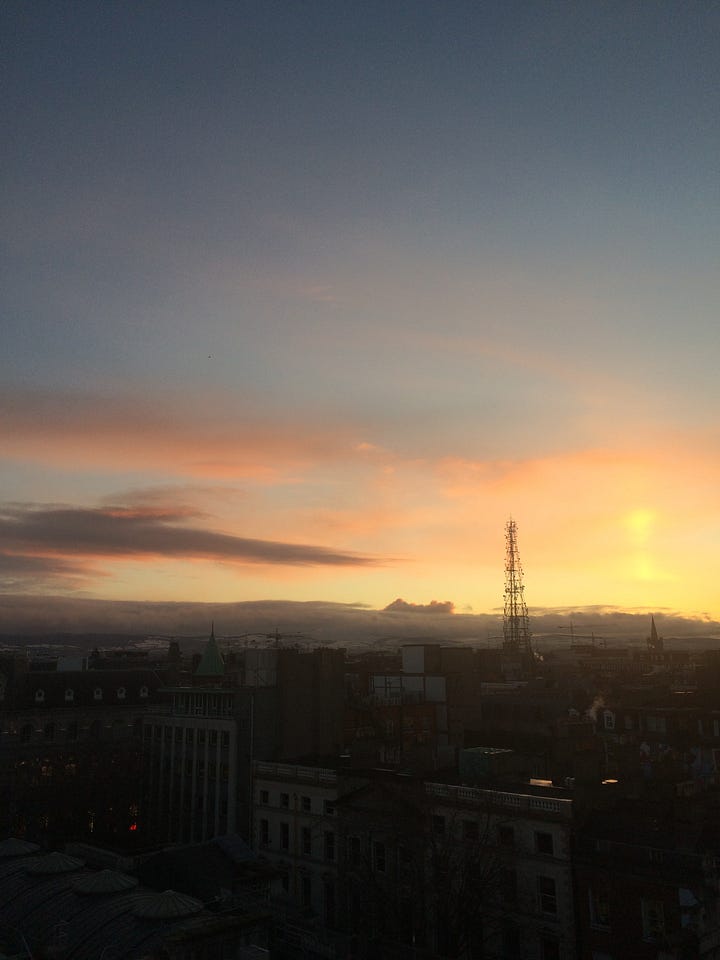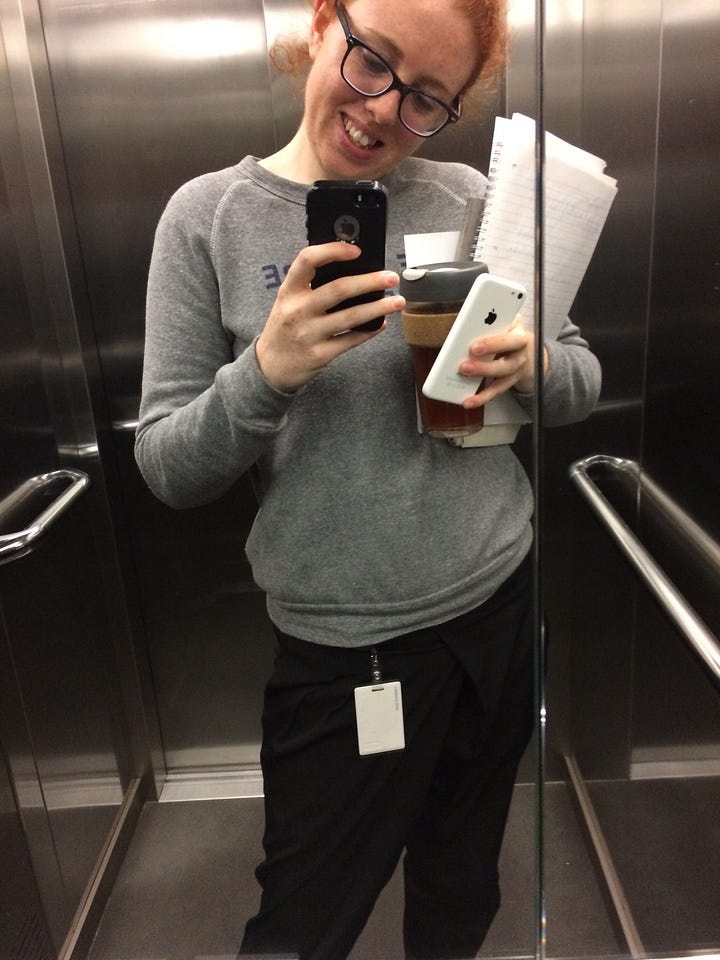What happens when you’re sexually assaulted at work
Reflecting on my time in the non-profit sector
Thank you for reading Beyond Survival, a publication about life after trauma. Usually, I frame my Friday posts around gratitude but this was a hard week, and I don’t have much gratitude in me. Instead, I’m writing about a sexual assault case that was before the courts this week. If that’s too much for you today, feel free to skip it.
The night before a man I used to work with appeared in court charged with sexual assault, I dreamt about an old boss. I was in my early twenties at the time, working in a part-time role for a small charity. I wasn’t paid very much, but it was the middle of a recession and I needed the money. My mother had recently died.
In the dream, he approached me from behind and put his hands on my body in a way that still makes me squirm and retch and wish I could die. He’d done this in real life too.
In the dream, I went to HR where two women leapt out of their chairs and assured me that I shouldn’t have to tolerate that kind of harassment. They promised they would deal with it immediately.
In real life, I didn’t go to HR. There was no HR to go to. In real life, I tolerated it and so much more because I needed the money.


On Monday, I was scrolling through the news when I saw a story about a man who pled guilty to sexually assaulting a woman at a work social event. I looked closer at the image and realised I knew him. LinkedIn confirmed it. We both worked in Amnesty International Ireland at the same time.
At a work social event, he sexually assaulted a more junior colleague in a “prolonged and protracted” attack. He had been drinking for up to 13 hours, fuelled in part by two free drink vouchers provided by Amnesty. (Paid for with donor funds, I presume?)
“I know alcohol can’t be used as a shield,” he said in court, before trying to do just that. He was described in court as “a very gentle person” (🙄) who was “shocked and horrified” (😡) at his behavior, and that it was “completely out of character” (🤬). The judge described his behaviour as “predatory” noting that there was also a more senior member of Amnesty at the event.
I searched online to see if Amnesty had said anything about it. Maybe they apologised to the staff member who’d been assaulted or promised to change their policies? On their website (which, incidentally, I project-managed the redesign of), they promise to “campaign for a world where human rights are enjoyed by all” and yet for their own staff, they didn’t think it was necessary to comment. I understand why. They’re not going to draw attention to a negative story. They wouldn’t want to say anything that might impact their ability to raise money.
This isn’t the first example of Amnesty mistreating its staff. A 2019 report found that the organisation has a toxic working environment, with widespread bullying, public humiliation, discrimination and other abuses of power. The review into workplace culture was commissioned after two staff members died by suicide, including Gaëtan Mootoo, a Mauritian human rights activist who cited work pressures in the suicide note he left for his family.
I left Amnesty in 2018. I’ve tried to write about my experience there several times and each time, it devastates me. The harm I suffered there (which, to be clear, wasn’t primarily sexual harassment) is still too raw. It’s been six years but the wounds still feel fresh.
I wished I was more resilient, but that’s not how trauma works. You don't just get over it. You live with it forever. There are good days and bad days.
This case brought me back to how unsafe I felt (and was) when I worked in Amnesty. I remembered all the times I spoke up about how my mental health was being shredded until I finally accepted that nobody cared. I left a few months before the abortion referendum and spent six months out of work, trying to find my way back towards life.
This week, I was dragged back into the past by riptide of trauma. I got up to pee in the middle of the night. When I came back to bed, my partner put her hand on my back and I broke down sobbing. There’s something about the brutality of seeing sexual assault described in the black and white of newsprint. Something about the ubiquitousness of it that threatens to drown me.
I remember a friend of a friend setting up an email auto responder to say that he’d be out of contact for a few years. He would be serving time in prison for possessing images of child abuse materials, though he didn’t put that in his email.
I remember a sunny Friday afternoon on Baggot Street when I saw a drunk man slapping women’s arses. Most of the women managed to pull their bodies away, but nobody intervened. “You wouldn’t hit a dog in the street,” I wrote in my journal when I got home.
In court this week, the victim described the brutality of the assault:
First, he “put his hand around my waist and squeezed”, other times he grabbed her “bum cheek,” squeezed her thigh and tried to kiss her neck and lips, she said. On one occasion, his finger was pushing into her dress near her vagina, she could feel the pressure and “felt like crying”. While she was standing at the bar, he came up behind her and pushed his penis against her bottom, she said. The first time she told him to stop, he smiled and did not reply. Later, he told her he “couldn’t take his eyes off her,” and another time, “he just smiled and laughed,” she said.
She is the person I thought about most this week. Her and all the rest of us who’ve been violated. She described how the assault had impacted her.
“She was “severely traumatised”, unable able to work, socialise or function normally and was left stressed, depressed and had suicidal thoughts. She had harmed herself and was now on disability allowance. She had “constant breakdowns”, from the stress and was on daily anti-depression and anxiety medication.
“Sad to say, I will never be the same,” she said.
I’ve written about workplace harassment several times:
When you joke about sexual violence, know one thing – survivors are listening
Reading Ciara Mangan’s powerful testimony about the workplace harassment she endured after being raped was eerily familiar to me. I have lost count of the number of times I’ve been in offices where people say appalling things about survivors of sexual violence. Continue reading…
On the nauseating pain of “you’re not his type”
A former colleague I’ll call Dan said it to me after I received a credible accusation of sexual misconduct against my then-boss. I wasn’t surprised exactly, but I was stunned. I instantly believed the woman. What she described sounded exactly like something that boss would do. By the end of the day, a half dozen more incidents had surfaced. Continue reading…
This week, I shared an interview with
, a WGA-nominated writer and producer for The Morning Show. Ironic to publish a show about workplace sexual harrassment in the same week that this case was before the courts, but as I said, sexual violence is ubiquitous.Sunday is Mother’s day in Ireland and I’ll be publishing a piece about my mother’s death. If you like to read it, please subscribe:
💕 If this piece resonated with you, please tap the heart below to help spread the word. If you really liked it, you might also like to share it with a friend.
✍️ Beyond Survival is written by me, Clare Egan, an award-winning writer and journalist. You can read more about me here, or look at some pretty pictures over here. Click reply to say hello anytime. Thank you for being here!







I'm so sorry you had to go through this Clare, I firmly believe NGOs are among the most toxic environments to work in, made all the worse because the double standard is so glaring and the extra potential for exploitation because of people's commitment to human rights!
Yes l agree with Paula's comment. So important to keep writing about this. Even in the wake of the #metoo movement, it remains way too difficult to get justice in situations like this, or to keep them happening in the first place! So yes, thanks for your courage.